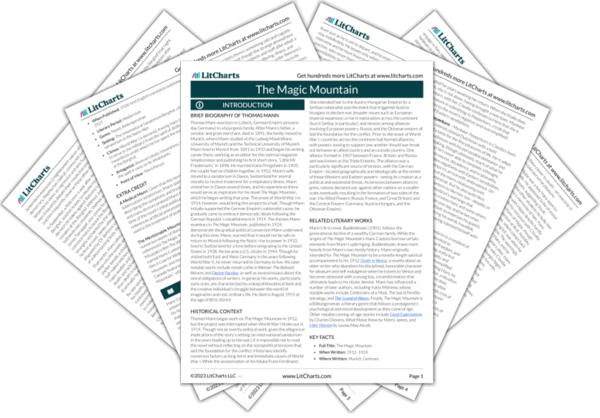Summary
Analysis
The first few days of October are cold and gloomy, but then the weather turns summery again. Hans feels as though he has a whole summer ahead of him. He fails to notice the many trees that have already shed their leaves. But Hans’s observations are just as capricious and fleeting as his body temperature, which is simultaneously “chilled and feverish.” These days he exists in a fog and can’t imagine what it’d feel like to be “sober” again. He loves to look at Clavdia, not because she is particularly beautiful, but because she increases this fogginess in him.
The Berghof’s indeterminate seasons reflect and add to the mysterious and inconsistent way that time passes there. They also mirror the directionless nature of life for many of the Berghof’s residents as they remain stuck in a state of limbo between life and death. Hans’s experience of being both “chilled and feverish,” meanwhile, represents the general ambivalence and passivity with which he approaches his life. He is neither saddened (“chilled”) nor angry (“feverish”) about his current situation. Instead, he exists in a “fog” somewhere in between.
Themes
As Hans looks at Clavdia, he considers her poor manners and slovenly appearance, and he thinks about what Settembrini said about sickness and depravity being the same thing. Surely Clavdia is sick—she’s here so often, after all—and so her illness must be “of a moral nature.”
Hans, drawing on what he’s learned from listening to Settembrini and Krokowski, speculates that Clavdia’s physical illness might be caused by some inner, “moral” flaw. Nevertheless, he continues to pursue her, suggesting that this illness “of a moral nature” may be what attracts him to her in the first place.
Themes
Yet Hans has started to feel less offended by Clavdia’s brand of bad manners—now, it’s Settembrini who most irritates him. Yes, the people at the Bad Russian table might not have great table manners, but what right has anyone to lay down a divide between good and bad? Gradually, Hans starts to experiment with poor manners himself. When he slumps over at meals, he finds that it actually feels quite good in his belly. And when he lets the door to the dining hall slam shut behind him without latching it properly, he finds that it’s rather convenient. But all these changes really show, the narrator points out, is that Hans has fallen in love with Clavdia, falling into a “reckless and unpolished” type of love that confounds and “degrad[es]” Hans.
In the novel, Settembrini represents humanist ideals of personal liberty, progress, and rationality. Clavdia, meanwhile, with her Russian background, represents sensuality and irrational passion. Given all this, the fact that Hans is now gravitating away from Settembrini and toward Clavdia signals that Hans is also embracing her values, which the book frames as destructive. Though Hans is theoretically staying at the Berghof to get well, he ironically may leave there worse off than when he arrived.
Themes
Hans feels a great thrill whenever Clavdia merely says “merci” when he lets her walk through a doorway before him. Another time, he adjusts a window in the dining hall so that the sun doesn’t shine so brightly on Clavdia, who silently thanks him from across the hall once he has returned to his seat. These events might seem ordinary and inconsequential, but they convey a broader motion of “tension and of gratifying release of tension”—though it remains unclear if they affect Clavdia as deeply as they affect Hans.
Hans pursues Clavdia as passively and unproductively as he pursues just about everything else in life. The “tension and gratifying release of tension” that characterizes his attempts at flirtation mimics his confused and contradictory attitude toward life in general.
Themes
Get the entire The Magic Mountain LitChart as a printable PDF.

One day, while Hans is sitting outside with Joachim, he sees Clavdia sitting across the way, smoking a cigarette. Wanting to make her jealous, he begins chatting with Hermine Kleefeld—but his plan backfires when Clavdia responds with defiant indifference. Flustered, Hans takes Joachim up on his suggestion that they retire to their rooms for a rest cure. After this, Clavdia ignores Hans for two whole days. On the third day, the weather is nice, and so Joachim and Hans go outside to take a stroll. During the walk, Hans sees Clavdia on the path ahead of them. Hans deliberately walks faster. When he reaches her, he says good morning, and she replies in her own language, with happy and receptive eyes.
It’s notable that this passage emphasizes Clavdia’s eyes. Hans has repeatedly compared Clavdia’s eyes to those of Hippe, the boy for whom he developed an irrational obsession as a child. Hans relates the distinct, slanted shape of both characters’ eyes to their Eastern origins. When he focuses on Clavdia’s eyes in this scene, then, it reinforces that Hans is most attracted to Clavdia’s “Eastern” traits, which in the book amounts to her idleness, her decadence, and her irrationality, to name a few traits.
Themes
Hans returns to Joachim, who didn’t bother to run ahead with him. Joachim, looking annoyed, tells Hans he looks flushed and that his temperature is probably raised again. But Hans remains overjoyed, even when he returns to his room and finds that Joachim was right—his temperature is 100.4 degrees.
Joachim, unlike Hans, has maintained his composure, his sense of duty, and his rationality all throughout his time at the Berghof. He has not let his irrational crush on Marusya, for instance, lose sight of the responsibilities “down below” that he aspires to return to. Hans’s irrational crush on Clavdia raises his temperature, and this reinforces the self-destructive nature of the romance.
Themes












